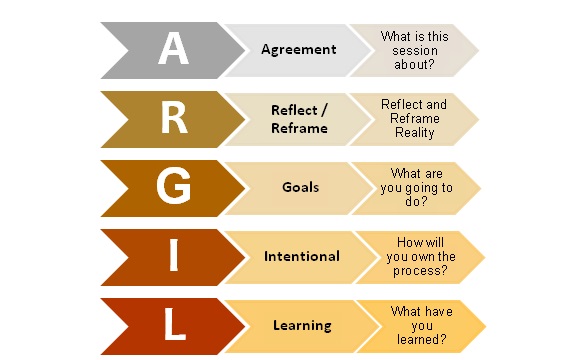A Coaching Model Created by Leslie Van Zyl-Smit
(Life Coach, SOUTH AFRICA)
It’s About the Clay
Whether to express the artist within or in search of a vessel with function; since the beginning of time man has been selecting, shaping, and processing clay into all kinds of pottery and earthenware. But the process always starts with a potter carefully selecting the kind of clay for the intended purpose. It’s the qualities of the clay that ultimately determines the outcome of the work on the potter’s wheel. It’s about the clay…
What is the meaning of “argil”? Simply put, “argil” is potter clay that is carefully chosen for its properties and its potential to be transformed into a useful, beautiful, and meaningful artifact. ARGIL Coaching is committed to a professional coaching relationship with clients that will support, encourage, and stimulate a process of personal discovery, development, and growth.
An “ARGIL” Client is someone creative, resourceful, and unique. ARGIL believes our Clients have the following essential similarities with good potter’s clay(Manders, 2019):
- Plasticity
- Porosity
- the ability to Vitrify
Plasticity
Usable potters clay has the ability to hold its shape or form while at the same time be pliable (bendable) enough to be moved into another shape.
In the same way, life requires all of us to be able to stand firm, yet at the same time be willing to adapt to circumstances or change direction from time to time.
Porosity
Good potter’s clay has the ability to absorb and release water evenly throughout. This property allows the clay to be plastic when wet, but also to dry out without cracking and losing its form and shape.
Life is a constant process of acquiring new learning, skills, and competency. In the same way that clay absorbs moisture, we all need to be able to absorb new awareness and knowledge through learning. But in the same way that clay also releases moisture during the drying process, we also sometimes need to let go of things like the past or perspectives that are not conducive to us plotting a course to a future state of being.
Ability to Vitrify
Vitrification is the third important quality of potter’s clay. Vitrification is the process of becoming glasslike when exposed to heat. This is the final process, or test before the potter’s work can be put to use.
Life is tough. Just like clay needs to be exposed to heat, so we all need to be tested along our journey through life. These tests are the experiences that allow us to take stock of our progress, to take a pause and reflect upon the reality of who we are and of where we are headed.
The ARGIL Model

To ensure a professional relationship with clients, ARGIL Coaching strives to provide coaching services by the International Coach Federation’s Competency Model and Code of Ethics.
Agreement
According to the International Coach Federation (ICF), the Coaching Agreement(International Coach Federation, 2019) is the “Ability to understand what is required in the specific coaching interaction and to come to an agreement with the prospective and new client about the coaching process and relationship.”
This agreement established with a client forms the core of the coaching interaction and is governed by the ICF PCC Competency #2 as follows:
Competency 2: Creating the Coaching Agreement
- A coach helps the client identify, or reconfirm, what s/he wants to accomplish in the session;
- A coach helps the client to define or reconfirm measures of success for what s/he wants to accomplish in the session;
- Coach explores what is important or meaningful to the client about what s/he wants to accomplish in the session.
- A coach helps the client define what the client believes s/he needs to address or resolve to achieve what s/he wants to accomplish in the session;
- Coach continues the conversation in direction of the client’s desired outcome unless the client indicates otherwise.
Reflect / Reframe Reality
The art of Coaching is to help the client articulate and achieve objectives, to discover new options, shift perspectives, and stimulate action. An essential part of this coaching process is to help clients reframe perspectives. We cannot always change our circumstances, but we can always choose to change our perspective upon such circumstances. Therefore, ARGIL believes that the typical session requires space for focused reflection on current realities and future possibilities that are centered around the session agreement. Thought processes are what drives our emotions, which in turn lead to action.
Goals
A successful coaching session implies forward movement toward the desired state in the future. This forward movement needs to be directed towards focused goals that are measurable, attainable, realistic, and time-bound. During the coaching session, the client needs to be assisted in formulating action in line with the session agreement.
Intentional
Having focused goals is still no guarantee that an AGRIL client will reach that all-important future state of being. Success is also dependent on a client being intentional about the journey and the cost thereof. Being intentional implies that one is aware of your own fundamental beliefs and that you are willing to make an effort to have your goals and behavior reflect those beliefs. ARGIL believes that the coaching process needs to assist clients in being intentional about the coaching session outcome as well as resulting future actions.
Learning
Learning is essential to our existence and is an indispensable tool to acquire new knowledge skills and competencies required to achieve progress towards goals in life. Life is about learning and the coaching process is no different. ARGIL Coaching believes that clients should be encouraged to strive toward new awareness and learning about the subject matter as well as on a personal level. An ARGIL Coaching session is all about facilitating and supporting a journey of change in the lives of clients and change comes through learning.
References
International Coach Federation. 2019. International Coach Federation. [Online] 2019.
Manders, Chad J. 2019. www.crimsonart.net. crimson. [Online] August 12, 2019.
